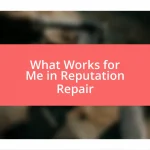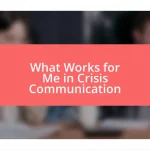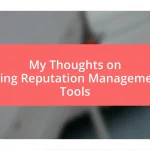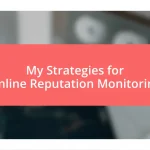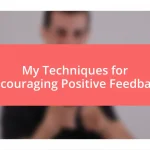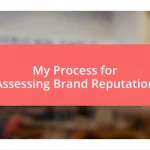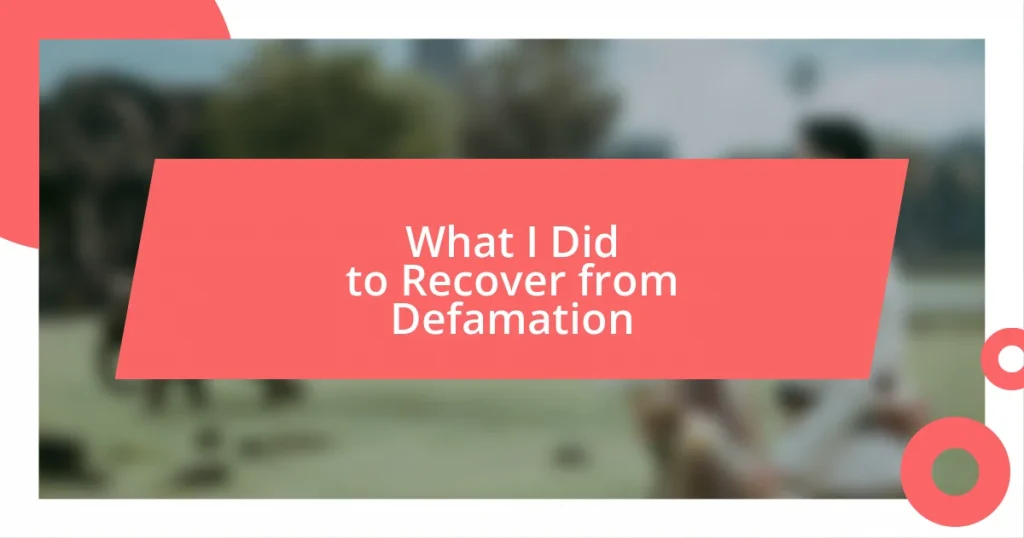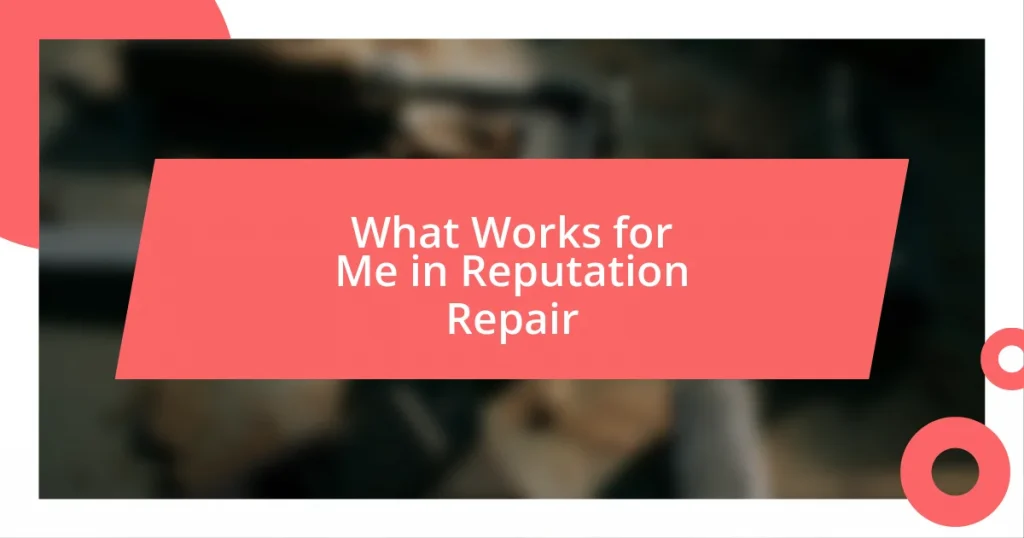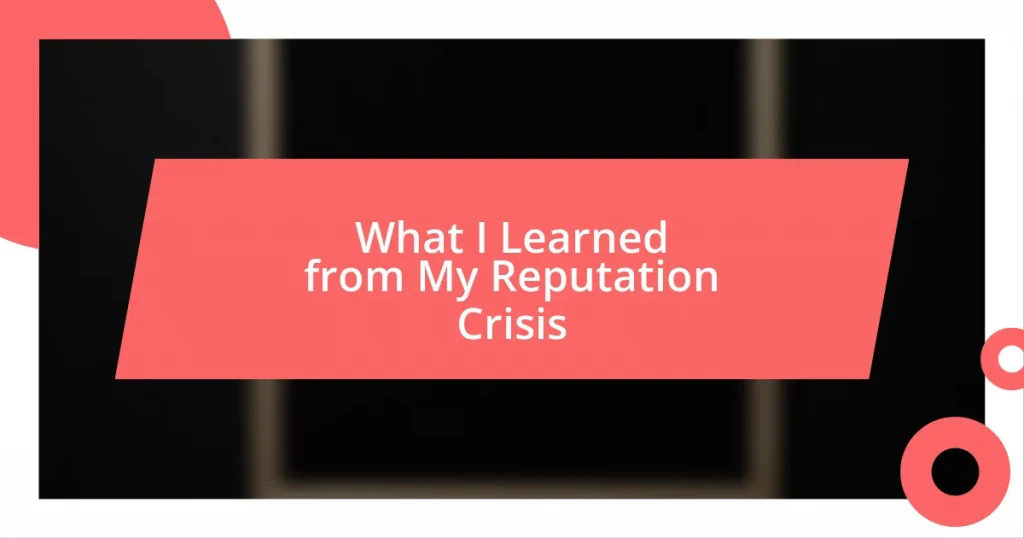Key takeaways:
- Recognizing and documenting the emotional and social impacts of defamation is crucial for recovery.
- Seeking legal assistance promptly and crafting a strategic response plan empowers individuals to take control of their narrative.
- Engaging in public relations outreach and nurturing personal relationships helps rebuild one’s image and self-esteem after defamation.
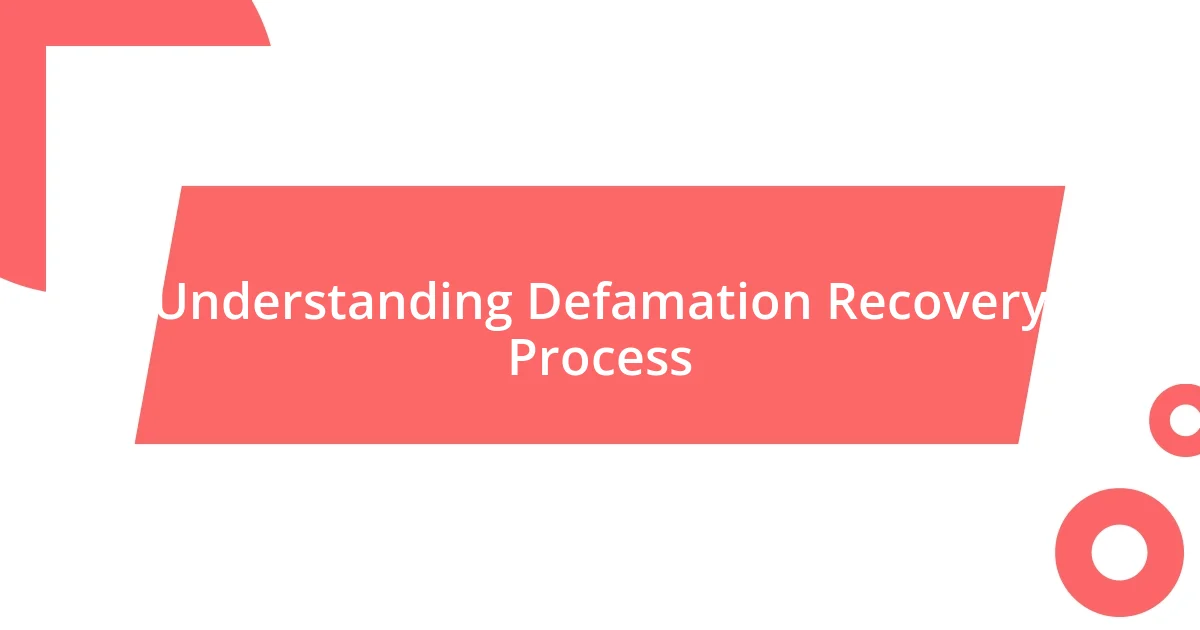
Understanding Defamation Recovery Process
Recovering from defamation is not just a legal battle; it’s a deeply personal journey. I found myself questioning my self-worth and wondering how an untruth could spiral out of control so quickly. Have you ever felt that sinking feeling when your reputation is on the line? It’s eye-opening to realize just how much our identity is tied to how others perceive us.
The recovery process begins with understanding the emotional toll defamation can take. I remember the sleepless nights spent replaying accusations in my mind, feeling stuck in a loop of doubt. It’s essential to acknowledge these feelings—whether it’s anger, sadness, or frustration—so you can begin to heal. Have you taken a moment to sit with your feelings, or do you find yourself trying to push them away?
Developing a strategic response is key to rebuilding your reputation. I discovered that surrounding myself with supportive friends and family made a world of difference as they reminded me of who I truly am. But how do you craft a narrative that counters the hurtful claims? I found that using positive experiences and affirmations helped me redefine my story, allowing me to step back into the light. It’s a process, but every small step counts.
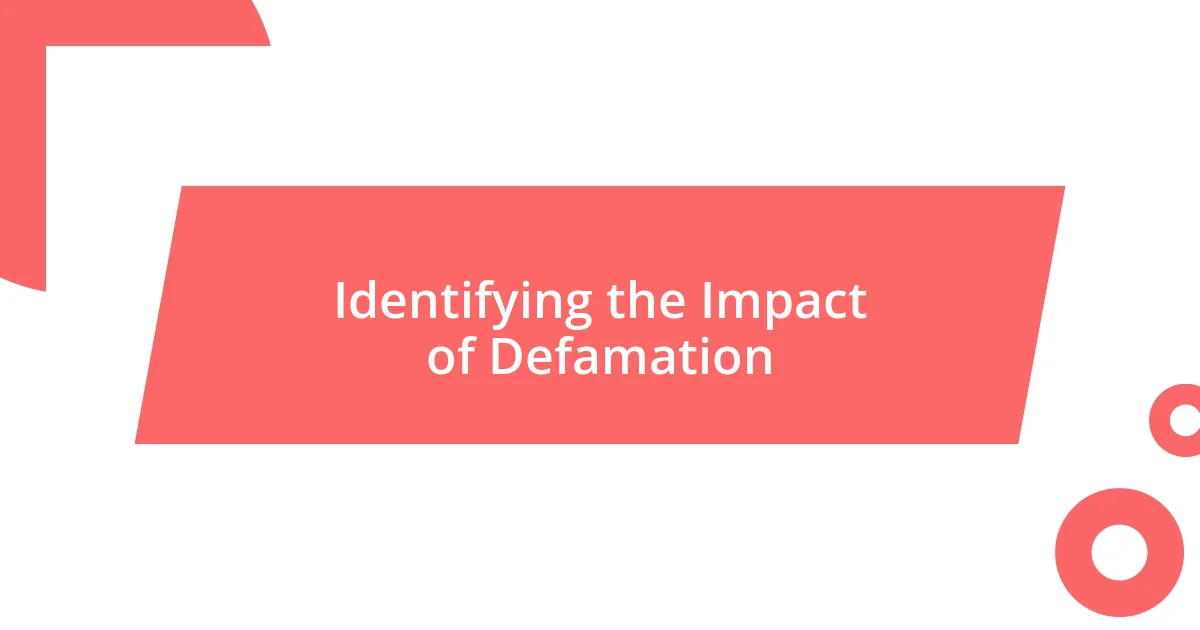
Identifying the Impact of Defamation
When I started to process the impact of defamation, the effects were more than just surface-level. My daily routine was disrupted; I felt on edge, often second-guessing myself in social situations. It was startling to see how deeply I was affected, not just in terms of my reputation but also my emotional well-being.
To truly understand the impact of defamation, consider these key aspects:
- Emotional Distress: I often experienced anxiety and frustration, which sometimes manifested in physical symptoms like headaches.
- Social Isolation: Friends didn’t know how to approach me, leading to a sense of loneliness as I distanced myself from conversations.
- Financial Consequences: For some, the fallout from defamation can lead to lost job opportunities, with potential long-term implications on career growth.
- Self-Perception: I found myself doubting my capabilities and worth, as those untrue statements echoed in my mind.
Recognizing these impacts was essential in my recovery journey, allowing me to articulate what I was working through and begin to strategize a way forward.
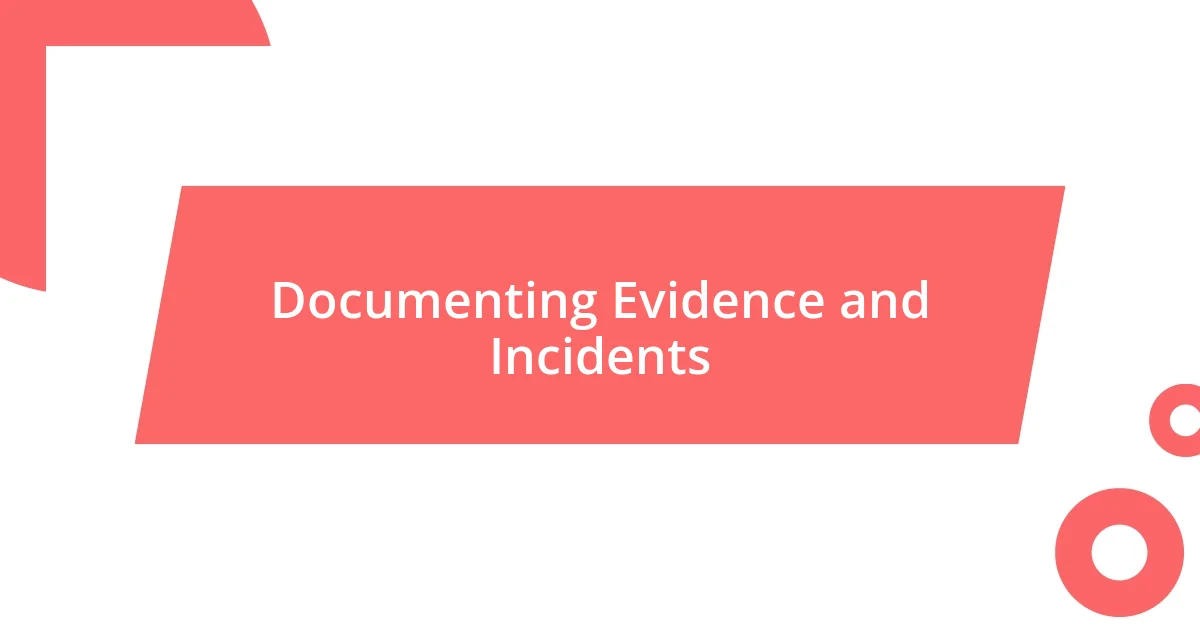
Documenting Evidence and Incidents
Documenting evidence during the recovery from defamation proved to be a pivotal part of my journey. I remember assembling a collection of messages, social media screenshots, and any relevant communications that reflected the untruths being spread about me. This process wasn’t just about building a case; it was a therapeutic activity, allowing me to confront the pain and regain a sense of control. Have you ever thought about how powerful documentation can be when you feel like your truth is being distorted?
I found that organizing my evidence chronologically helped me to create a clear timeline of events. It illuminated patterns in the incidents that could easily have been buried by my emotional turmoil. It was eye-opening to see everything laid out so clearly. Have you considered how the clarity of documentation can help you articulate your experience to friends or even professionals?
This process also involved taking notes on my emotional reactions during incidents related to the defamation. Each time I faced a hurtful remark or a patronizing glance from others who believed the lies, I jotted down my feelings and thoughts. This not only served as a way to track my healing journey but also provided crucial context for anyone who might later need to understand the depth of what I was going through.
| Evidence Type | Purpose |
|---|---|
| Social Media Screenshots | Shows the spread of false claims |
| Text Messages | Documents direct conversations tied to defamation |
| Personal Notes | Reflects emotional responses and patterns |
| Witness Statements | Provides third-party accounts of incidents |
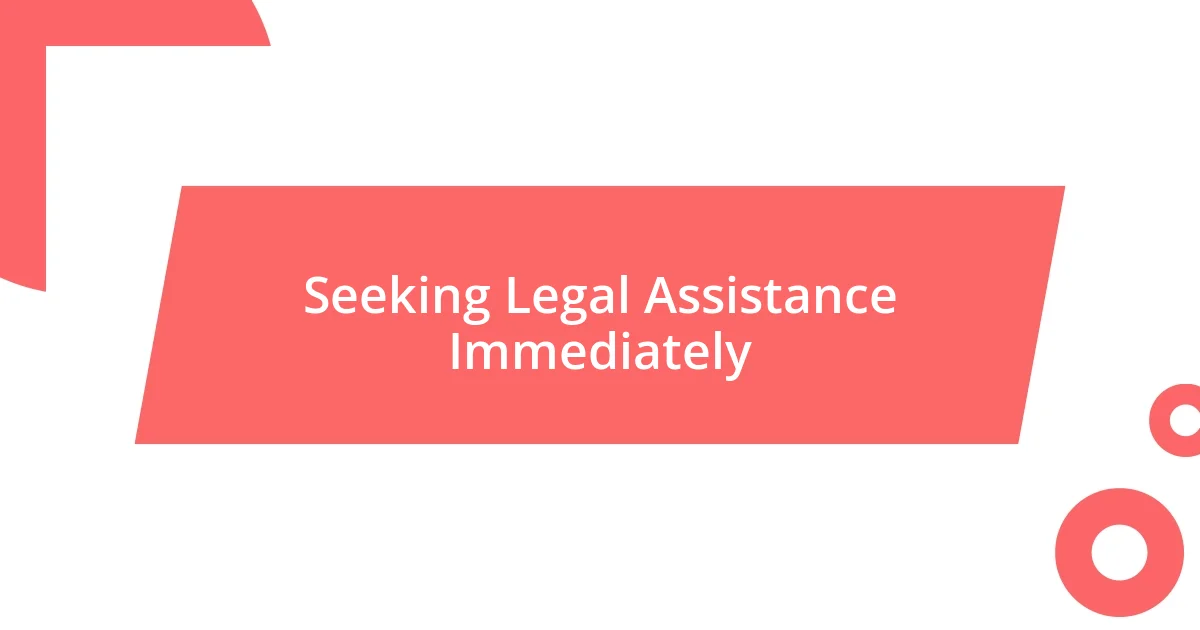
Seeking Legal Assistance Immediately
Seeking legal assistance promptly became a non-negotiable step in my recovery from defamation. I vividly recall walking into the attorney’s office, feeling a mix of fear and relief. The uncertainty of my situation was daunting, but having a legal expert by my side certainly provided a sense of reassurance.
I’ve learned that defamation cases can be time-sensitive, and delaying action may hurt your chances of recovering damages. Did you know that certain statements have a statute of limitations? Time can slip away without you realizing it, and I certainly didn’t want to miss my opportunity for justice. The moment I reached out to my lawyer, it was as if a weight lifted off my shoulders—I had someone knowledgeable protecting my interests.
Discussing the intricacies of my case with my legal advisor also became a turning point in my healing process. I was able to articulate my feelings of vulnerability, which helped me shape my narrative effectively. It wasn’t just about the facts; it was about regaining my voice after feeling silenced by the falsehoods. Isn’t it empowering to know that you can take legal action when others attempt to undermine your truth?
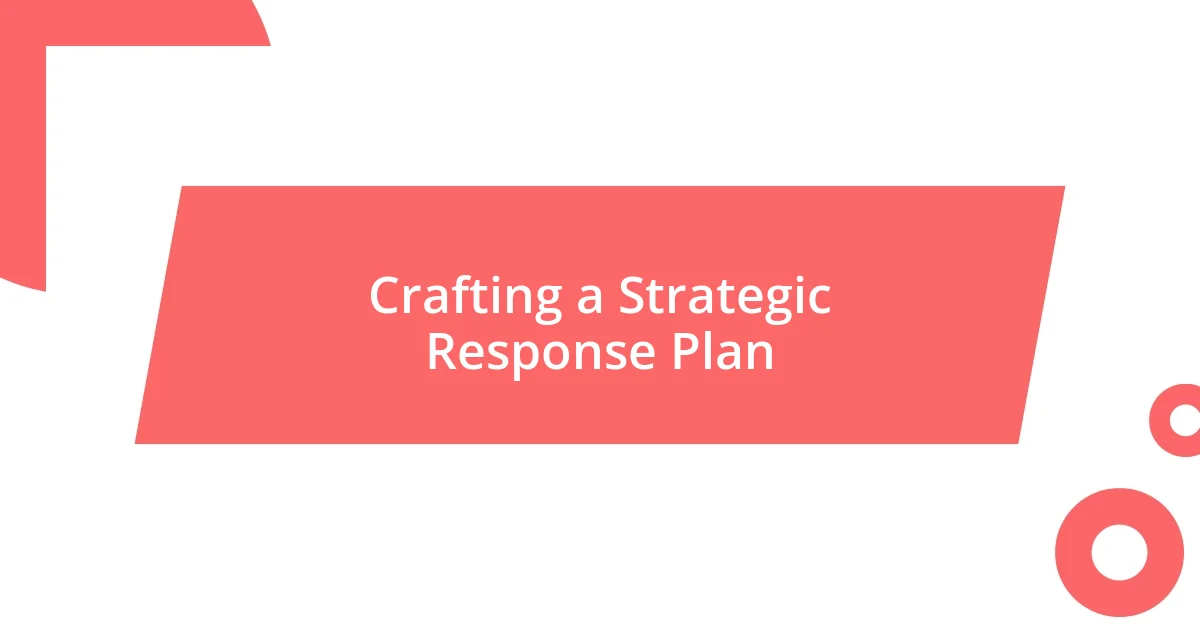
Crafting a Strategic Response Plan
Crafting a strategic response plan became essential as I navigated the complex waters of defamation. I found myself asking, “What steps can I take to reclaim my narrative?” The answer was building a thorough plan that detailed how I would address the falsehoods being spread about me. This plan included a clear outline of my key messages, which not only helped me stay focused but also empowered me to communicate effectively with those asking questions or expressing doubts.
As I refined my response plan, I made it a point to include a section dedicated to potential obstacles. I thought about how people might react and prepared myself for a range of responses. There were days I felt overwhelmed by the enormity of it all, but recognizing possible challenges made me feel proactive instead of reactive. Have you ever looked ahead and felt more in control simply by anticipating what might come next?
I also decided to practice my responses with friends and family. It was eye-opening to see how they received my messages. Their questions and feedback helped me adjust my tone, ensuring my communication was not only assertive but also compassionate. It reminded me that being sincere in sharing my story could resonate with others. Have you ever found that sharing your journey could transform how both you and others perceive the truth? Through this process, I experienced a surge of confidence that came from owning my narrative again.
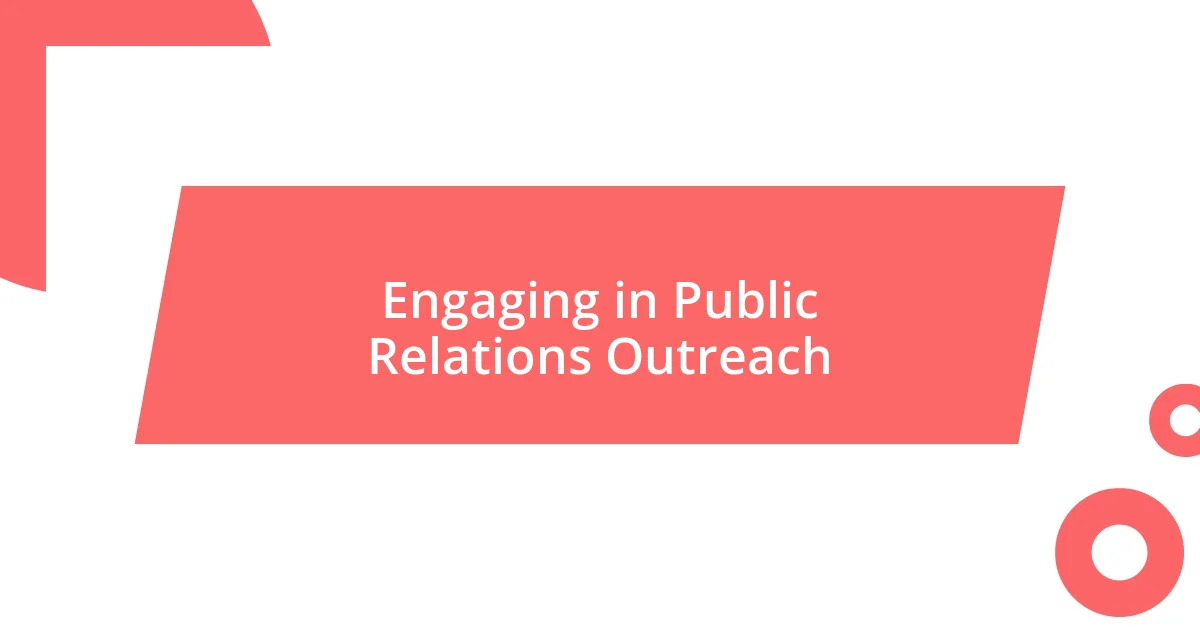
Engaging in Public Relations Outreach
Engaging in public relations outreach was a pivotal step in my recovery journey from defamation. I remember standing in front of my computer, unsure of how to reshape my public image. Crafting press releases and engaging with media representatives felt daunting at first, but I soon realized that transparency would be my strongest ally. How often do we underestimate the power of openly sharing our side of the story?
After identifying key media contacts, I reached out personally, sharing not just the facts, but my emotional journey as well. It was during these conversations that I felt a shift; it wasn’t just about damage control but also about rebuilding relationships. As I opened up about my experiences, I started to see my narrative being embraced rather than judged. Have you ever noticed how vulnerability can foster connection? It felt incredible to be received with empathy rather than skepticism.
As I engaged in social media outreach, I found it essential to supplement official statements with genuine interactions. I began tweeting and posting updates that highlighted my values, interests, and aspirations. This not only helped to reshape my image but also reignited my passion for community engagement. Seeing positive reactions from supporters was uplifting; it reminded me that the truth sometimes needs a little nudge to shine through. Isn’t it reassuring to realize that sincerity in sharing your story not only helps you heal but also fosters a community of support?
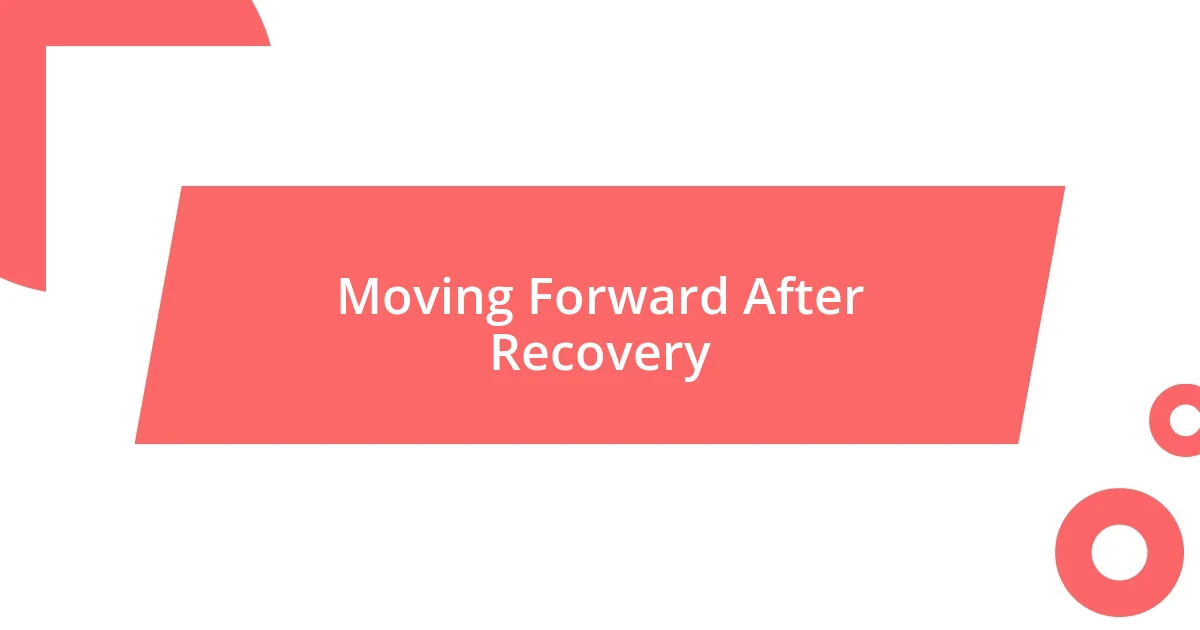
Moving Forward After Recovery
Once I’d worked through the initial stages of recovery, I focused on rebuilding my self-esteem and personal relationships. I remember a quiet afternoon spent with an old friend, just reminiscing and laughing over coffee. That connection reminded me of the support system I had all along, which was crucial in moving forward. Have you ever felt how essential it is to lean on those who care during tough times? Cultivating these bonds became a significant part of my healing process, teaching me that nurturing relationships is just as vital as addressing the defamation itself.
Another key to my recovery was embracing new opportunities that emerged in the aftermath. I took up a new hobby, photography, which opened my world to fresh perspectives and creative expression. As I captured moments through my lens, I felt a sense of liberation; it was like reclaiming a part of myself that had been overshadowed. Can you recall a time when engaging in something new helped you shift your focus? It’s fascinating how simply redirecting our energy can pave the way for personal growth.
With each step forward, I also made it a point to reflect on my experiences through journaling. Writing gave me the freedom to process my emotions and formulate my thoughts without fear of judgment. There were days I felt triumphant, and others where the weight of the past crept back in, but putting pen to paper allowed me to release those burdens. Have you ever discovered how powerful it is to articulate your journey? This practice didn’t just help me move on; it transformed my narrative into one of resilience and hope.
